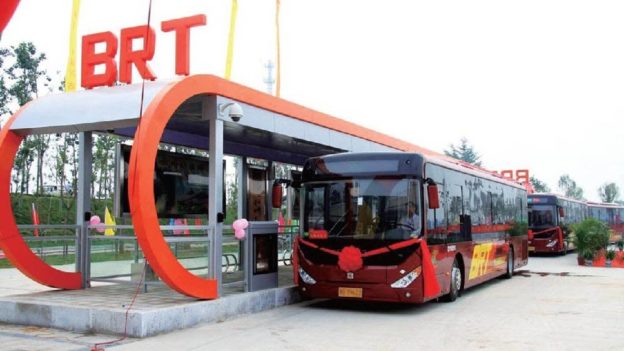Peshawar Bus Rapid Transit (BRT) Environmental Monitoring Report has declared unsatisfactory the project`s environmental, healthcare and safety compliance during the first two months ending on Dec 31, 2017.
These endings are contained in a 41-page Environmental Monitoring Report and a 70-page annexure looking into potential and actual environmental, health and safety hazards and their risks and mitigation measures has been prepared by the MM Pakistan for the executing agency, Peshawar Development Authority (PDA), and donor ADB.
The report noted that the contractor had been strongly advised to remove all deficiencies and gaps in the implementation arrangements for the environmental, health and safety requirements.
It said the Project Management Construction Supervision Consultants` (PMCSC) environment, health and safety management teams were constantly pushing contractors for the resolution of prevailing environmental issues such as high levels of dust along the project corridor, presence of debris/excavated material along the project corridor, traffic congestion due to construction activities and other relevant issues related to the campsites.The report said keeping in view the fact that the project was being executed in a highly-urbanized environment, it was expected that the environmental issues related with dust emissions and excavated material would continue to arise.`However, all efforts shall be made for the minimization of these impacts in light of the project`s Environmental Management Plan (EMP),’ it said.
The report identified high level of dust, traffic congestion and need of taking health, safety and environment (HSE) related measures along the BRT corridor and noted the corrective measures had been taken to address them.`The construction of the project is in progress on a fast track basis and the general HSE conditions at the project have so far been unsatisfactory,` it said.The report said both the contractor and the PSCMC had deployed 111 HSE staff members for the project.
It included a detailed independent environmental monitoring through a third-party laboratory to check air quality, noise, drinking water and in house environmental monitoring through handheld devices at specific locations along the corridor.The report said since most of the material generated from the Reach-H corridor was earthen material, which was being generated due to the excessive piling activities.It said the material had a high demand and that it was sold to third party contractors.The report said the disposal of excavated material at unauthorized and random locations had been observed along the project corridor and the Reach-H corridor remained most affected due to the practice.
The report said the records provided by the PDA showed that it was only the civic agency, which had felled trees for the project, and that the contractor didn`t chop down any tree. Around 26,500 small and large trees have been cut down or uprooted and that majority of them have been replanted at different locations of the city, it said.The report said major sources of dust production along the BRT Corridor included the movement of traffic at unpaved sections of the corridor, haulage of earth material, presence of dry excavated material at the roadsides, and construction machinery`s movement at the drainage work construction areas along the corridor.
The environmental inspection checklists contained in the annexure for Reach-I said the stored material or spoil heaps could contribute to dust production.The checklists also pointed out that there were no proper drainage and sewerage system for storm water; waste bins were not available at sites in adequate number. They also pointed out spillage of oil and other hazardous chemicals on the soft ground.The checklists also mentioned similar omission for construction sites in all three reaches, batching plants, residential camps and workshops.
When contacted, PDA director general Israrul Haq said considerable HSE improvements had been made. He said the standards mentioned in the report were of international level and in many instances, workers in Peshawar didn`t follow such standards but even then, they were trying to implement them.








